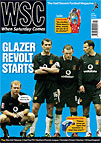 Being league runners-up and FA Cup winners doesn’t sound too bad, but, as Arsenal prepare for a last close season at Highbury, Jon Spurling reports on a growing sense of unease
Being league runners-up and FA Cup winners doesn’t sound too bad, but, as Arsenal prepare for a last close season at Highbury, Jon Spurling reports on a growing sense of unease
After Arsenal remained unbeaten during the 2003-04 season, Arsène Wenger commented: “I enjoy a feeling of fulfilment when I feel the team has deserved its success.” Judging by his beatific grin at the end of the FA Cup final, undeserved success is a more than acceptable alternative. Dogged defending, a packed midfield, goalkeeping heroics, “lucky” and/or “boring” prefixes in tabloid reports, and the Millennium Stadium sound system belting out a tinny version of One Nil To The Arsenal; the “windfall final” was reminiscent of the club’s cup triumphs a decade ago. Short of John Jensen joining the midfield fray at some point in the second half, or Paul Merson indulging in a spot of mock lager swigging after Patrick Vieira dispatched his winning penalty, this was as close to a George Graham-style win as you could get. Yet only the most blinkered Arsenal fan would suggest that Wenger’s tactical genius (playing Bergkamp as a lone striker was never likely to bear fruit) was behind Arsenal’s unlikely victory. He got lucky.
Wenger may have inadvertently stumbled upon the prototype of a formation that could succeed in the Champions League over the next few years. Arsenal’s cavalier approach, which destroys the majority of Premiership sides, is doomed to failure against Europe’s finest, who treat contests like games of chess. Bayern Munich and Chelsea realised that by close marking Thierry Henry, Robert Pires et al, the Gunners – unable to adapt to a slower, more technical game – become tetchy and desperate. When an Arsenal team containing such luminaries as Steve Morrow and David Hillier won the Cup-Winners Cup in 1994 by defeating a far more talented Parma side, Tony Adams commented: “We won by tangling them up in a spider’s web. Then we broke away quickly when it was possible.” Although the Champions League represents a far greater challenge, Graham’s tactics – with defenders and midfielders merged into a deflective wall – were better suited to the vagaries of European football.
Arsenal’s approach in the FA Cup final, with the midfield five protecting the defence in the face of relentless United attacking, may be the team’s first tentative move towards a more flexible approach. Intriguingly, Wenger hinted in a recent Canal Plus interview that he might be prepared to utilise a sweeper system in next year’s Champions League and admitted that “a slower pace of game is required”.
Whether or not Wenger will have the personnel needed to launch a genuine offensive on Europe’s finest remains to be seen. The precise contents of his much vaunted “summer war chest” are a mystery and much will depend on his diplomatic skills, motivational powers and downright ruthlessness in the close season. Convincing an increasingly battle-worn Sol Campbell – even if he is to be deployed in a European sweeper system – that he may have to play second fiddle to the emerging Philippe Senderos could be difficult. So will casting sentiment aside and ditching the error-prone Jens Lehmann, despite his Cardiff heroics, and informing Pires that at the highest level he no longer has the physical presence required to make an impact against the very best. But do it he must.
As the recent Football Association inquiry into Ashley Cole’s meeting with José Mourinho shows, Roman Abramovich’s mere presence in west London means that the “special one” is capable of unsettling Arsenal’s squad at will. In Cardiff, Wenger spoke defiantly of his team’s “amazing ability to compete with teams whose finances are far stronger than ours”. With Malcolm Glazer’s grandiose plans to extend Manchester United’s commercial empire and Abramovich’s pledge to support Mourinho in bringing new stars to Stamford Bridge whatever the cost, Wenger’s adeptness at polishing youngsters into international stars remains his club’s biggest asset.
Recent noises suggest that the Arsenal suits consider that the Emirates Stadium will be an arena befitting a member of the G-14 group and that the team, at last, will be able to rise to the European challenge in more grandiose surroundings. At best, that is a ridiculously over-simplistic view and fans’ rumbling discontent about rising ticket prices, not to mention the debts incurred by the club from the move, could prove to be extremely weighty millstones in the years to come.
More crucial will be Wenger’s success in altering the club’s culture of underachievement in Europe. The players believe that the issue is a psychological one, although the boss, however belatedly, hints that the problem could be tactical. “We just need a stroke of luck,” insists Thierry Henry. But as the victory in Cardiff proved, luck is the one thing Arsenal would seem to have in abundance.
From WSC 221 July 2005. What was happening this month